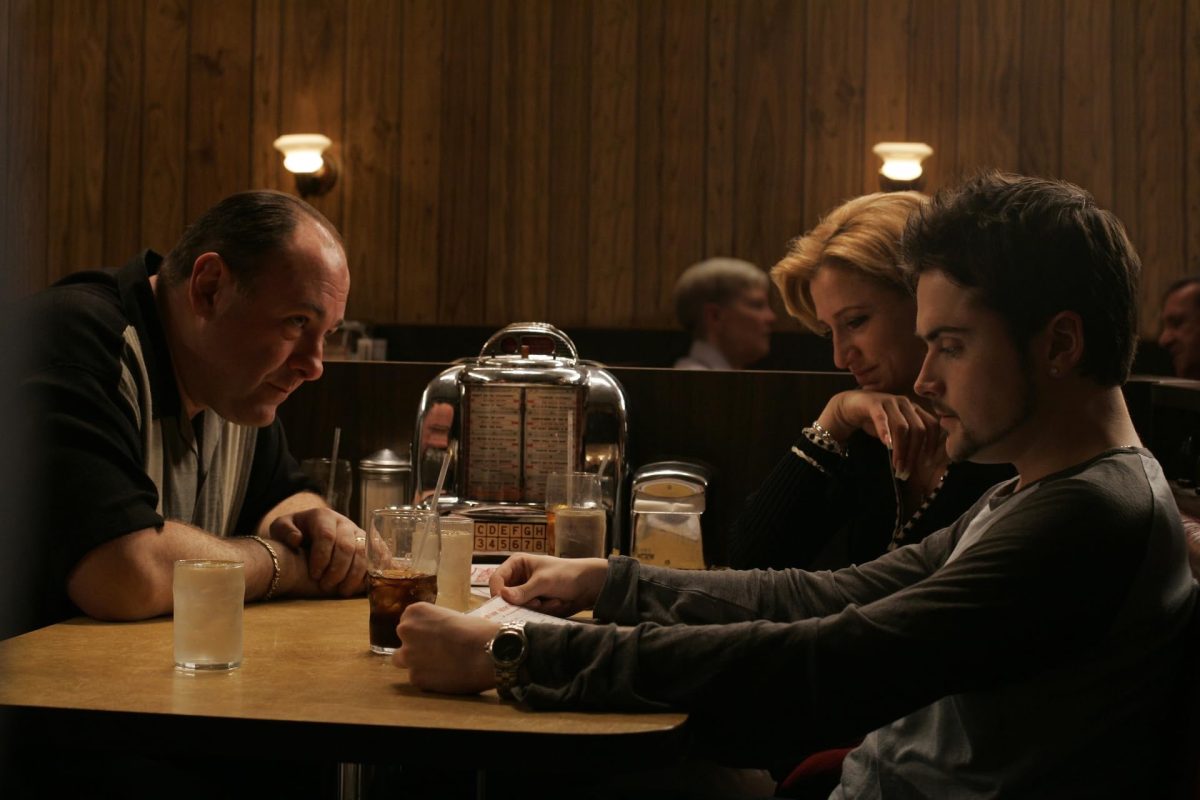In January of 1999, America was introduced to a staple of Sunday night television for the next eight years as New Jersey mob boss — sorry, “waste management consultant” — Tony Soprano, portrayed by the late-great James Gandolfini, did the unthinkable and went to therapy.
Within his sessions with Dr. Jennifer Melfi (Lorraine Bracco), we learn that Tony continually struggles to balance his family life — a near mirror image of the daily lives of Italian Americans — and his devious work hierarchy as a patriarch of both dynamics. He maintains a marriage with his wife, Carmela (Edie Falco), despite his numerous mistresses, and shows himself as someone who truly loves his children Meadow (Jamie Lynn-Sigler) and A.J. (Robert Iler), in his own twisted way. We are let into the complex and unstable relationship Tony has with his mother, Livia (Nancy Marchand) and sister, Janice (Aida Turturro), as their bonds seem to teeter between obligatory love and hate.
In his other life, he walks the tightrope of friend and boss of a very colorful cast of characters, including Peter Paul “Paulie Walnuts” Gualtieri (Tony Sirico), Silvio Dante (Steven Van Zandt) and Salvatore “Big Pussy” Bonpensiero (Vincent Pastore). These two lives, however, are not separate by any means, as he does business with his hot-headed nephew, Christopher Moltisanti (Michael Imperioli) and shady uncle Corrado “Junior” Soprano (Dominic Chianese), with eventual capo Bobby Bacala Baccalieri (Steve Schirripa) marrying Janice. Tony’s two families are innately intertwined.
The genius of “The Sopranos,” however, is not found solely in Tony’s dance between lives — it’s in the brilliance of the actual stories the show tells. “The Sopranos” ran the gamut of drama in an almost Shakespearean way. Tony’s story bears striking resemblance to King Lear’s — both Dr. Melfi and Silvio mirror the fools, being the only ones who could tell Tony what he didn’t want to hear. His relationship with Uncle Junior and Livia is even Hamlet-adjacent as they conspire to have him whacked.
Intertwined with these sagas of crime and family drama, though, are the simple things: playing Mario Kart with A.J., heart-to-hearts with Meadow in the kitchen, tiny arguments between the siblings and ridiculous teenage banter between grown men who share decades of friendship. So much seems to happen in a seemingly simple conversation over a quintessentially Italian Sunday dinner.
That being said, there is no shortage of viewers critical of the show’s portrayal of Italian Americans. Shortly after the show’s premiere, Chairman Frank Guarini of the National Italian American Foundation began a campaign to have the show canceled, citing its “terrible stereotyping and unfair portrayal of Italian American families.” A year later, the New York City Columbus Day Parade organizers were even convinced to uninvite Lorraine Bracco and Dominic Chianese. Considering the person for whom the holiday is named, I’d say their attention was not in the right place.
As an Italian American, I can try to understand these groups’ concerns. The minute Italians stepped foot in the United States, they were met with the gangster label that seems to have permeated a major portion of film and television history. Their worries make sense. For a while, I occasionally found myself agreeing with the sentiments of people like Guarini.
But what the hell did I know? Not a whole lot, until I really paid attention.
“The Sopranos” does not propagate Italian American stereotypes — it showcases their history in the country and our way of life through the lens of a certain group of people that fascinates the general public. Throughout the show’s six seasons, viewers are constantly reminded of the struggles of Italian immigrants when they first arrived in the United States, and how these struggles were overcome through trials and tribulations. Tony’s rants about his ancestors’ rejections from established churches and Italians building cities, among other things, are words that I could hear coming from my own family members of that generation. From these talks and displays of pride to family dinners, coffee chats and general lingo, creator David Chase was entirely truthful to our culture in his writing.
A good show needs drama. “The Sopranos” gets that from a gangster setup that does not glorify a life of organized crime at all. Although it’s very easy to fall in love with the kooky cast of paesans, we are constantly reminded of how terrible these people are. Their violence knows no bounds. Quite frankly, they are disgustingly racist, homophobic, antisemitic — you name it. As Michael Imperioli said in a 2001 interview, “it’s not all pasta and wisecracks.”
Still, we still love them in some warped way — and thus, the anti-hero trope was born. “The Sopranos” laid the groundwork for the Walter Whites and Dexter Morgans of the world. The show revolutionized television dramas. It’s not just a picture of Italian American life and its complex history, it’s a nuanced story the likes of which had never gained such traction.
Even after 25 years, “The Sopranos” is as good as ever. Its anti-heroes are still equally lovable and loathsome, and its depiction of everyday Italian American life still rings true, it just shows it through decidedly bad people. They don’t represent every single one of us. We don’t all share the toxic masculinity or bigoted views of Tony Soprano and his soldiers. The show just highlights a certain sect, a specific group of people. The show is a classic, and we will never “fuggedaboutit.”
Contact Joseph Paladino at [email protected].























































































































































